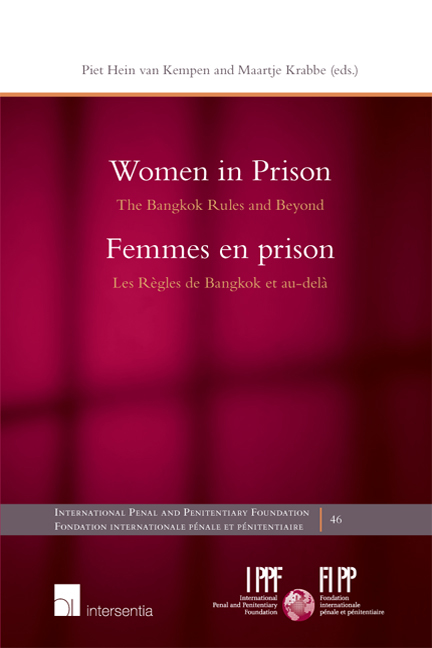Book contents
- Frontmatter
- Foreword
- Avant-propos
- Acknowledgements
- Remerciements
- Contents
- Part I Introductory Synthesis and Analyses: 1ÈRE Partie Synthèse ET Analyses Introductives
- Part II Themes: 2ÈME Partie Thèmes
- Part III National Reports: 3ÈME Partie Rapports Nationaux
- Women in prison in Argentina
- Women in prison in Australia
- Women in prison in Austria
- Women in prison in Brazil
- Women in prison in England and Wales
- Women in prison in Finland
- Femmes en prison en France
- Women in prison in Germany
- Women in prison in Greece
- Women in prison in Ireland
- Femmes en prison en Italie
- Women in prison in the Netherlands
- Women in prison in New Zealand
- Women in prison in Poland
- Women in prison in Portugal
- Women in prison in Russia
- Women in prison in South Africa
- Women in prison in Spain: their criminological and social invisibility
- Femmes en prison en Suisse: la situation des femmes prévenues et condamnées
- Women in prison in Taiwan
- Women in prison in Thailand: implementation of the UN Bangkok Rules in the Thai criminal justice system
- Femmes en prison en Turquie
- Women in prison in the USA
- Appendix The Bangkok Rules: Annexe Règles De Bangkok
- The International Penal and Penitentiary Foundation: History and Purpose
Women in prison in Poland
from Part III - National Reports: 3ÈME Partie Rapports Nationaux
Published online by Cambridge University Press: 25 September 2018
- Frontmatter
- Foreword
- Avant-propos
- Acknowledgements
- Remerciements
- Contents
- Part I Introductory Synthesis and Analyses: 1ÈRE Partie Synthèse ET Analyses Introductives
- Part II Themes: 2ÈME Partie Thèmes
- Part III National Reports: 3ÈME Partie Rapports Nationaux
- Women in prison in Argentina
- Women in prison in Australia
- Women in prison in Austria
- Women in prison in Brazil
- Women in prison in England and Wales
- Women in prison in Finland
- Femmes en prison en France
- Women in prison in Germany
- Women in prison in Greece
- Women in prison in Ireland
- Femmes en prison en Italie
- Women in prison in the Netherlands
- Women in prison in New Zealand
- Women in prison in Poland
- Women in prison in Portugal
- Women in prison in Russia
- Women in prison in South Africa
- Women in prison in Spain: their criminological and social invisibility
- Femmes en prison en Suisse: la situation des femmes prévenues et condamnées
- Women in prison in Taiwan
- Women in prison in Thailand: implementation of the UN Bangkok Rules in the Thai criminal justice system
- Femmes en prison en Turquie
- Women in prison in the USA
- Appendix The Bangkok Rules: Annexe Règles De Bangkok
- The International Penal and Penitentiary Foundation: History and Purpose
Summary
INTRODUCTION
Following political changes in 1989, Poland has evolved into a democratic state based on the rule of law and implementing the principles of social justice. In 1997 new criminal legislation was adopted governing criminal responsibility (the Criminal Code of 1997, hereafter referred to as “the CC”), criminal procedure (the Code of Criminal Procedure of 1997, hereafter referred to as “the CCP”) and the execution of criminal sentences (the Code on Execution of Criminal Sentences, hereafter referred to as “the CECS”). The new criminal legislation, together with the new Constitution of 1997 and the European Convention on Human Rights, ratified shortly after the start of the transition process, have formed the basis for considerable changes in the Polish penitentiary system. Respect for the human rights of inmates became the most important challenge for our correctional facilities. A lot has been done since then to build up the system, complying with various international standards. In 2004 Poland joined the European Union. European funds have increased the opportunities to address various rehabilitation programs for those convicted of offenses. However, the rapid growth of criminality at the beginning of the 21s t century resulted in overcrowding in prisons, which was controlled at the expense of reducing the rehabilitation capacity of correctional facilities.
INTERNATIONAL AND HUMAN RIGHTS FRAMEWORK
INTERNATIONAL ORGANIZATIONS
Poland is a member of the following international organizations: the United Nations (since 1945); the Council of Europe (since 1991); the European Union (since 2004); and the Organization for Security and Cooperation in Europe (since 1973).
INTERNATIONAL HUMAN RIGHTS TREATIES AND CONVENTIONS THAT SPECIFICALLY CONCERN WOMEN
Poland is a contracting party to the following international human rights treaties concerning women: UN Convention on the Elimination of All Forms of Discrimination against Women (since 1980); UN Optional Protocol to the Convention on the Elimination of All Forms of Discrimination against Woman (since 2003). No reservations have been made to these Conventions. Poland is not a party to the Council of Europe Convention on preventing and combating violence against women and domestic violence, adopted in 2011.
In addition to binding legal acts, the Polish penitentiary system respects the following non-binding international instruments:
- the Standard Minimum Rules for the Treatment of Prisoners adopted in Geneva in 1955 by the First United Nations Congress on the Prevention of Crime and the Treatment of Off enders; and
- Type
- Chapter
- Information
- Women in PrisonThe Bangkok Rules and Beyond, pp. 585 - 612Publisher: IntersentiaPrint publication year: 2017



